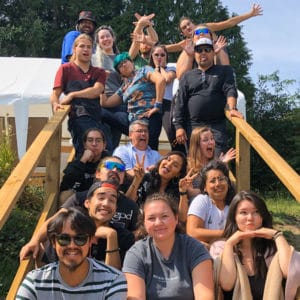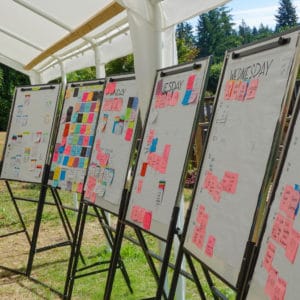Brother, ima Bassist
I didn’t have enough Mandarin to be able to speak to anyone but a few people and hunt from the friendliest of players, and I mostly took pictures, took video, and helped David with some table game pointers. The kids were great, really bright, and really sweet. David had his posse of boys running after him and he’d play basketball with them and the girls would follow Irene around. They took to WAYK pretty well,
Lo Fan and I eventually got the chance to play some music together, but we only had one guitar, and I play left handed. But still, we got a chance to get to know each other. He just graduated from the University, he told me the name but I forgot. He did say that it was a third tier school, and the government made it possible, or something along those lines. It was refreshing to have someone to talk to, from the area, who was just a regular dude. He didn’t put on any airs and was honest and direct with his questions.
He also told me that I was the first westerner that he ever spoke English with. I asked him, “Hasn’t he meet any other foreigners?” and he said, “Yeah, but they know Mandarin and you don’t know any.” I laughed, because it was true, and we smoked another cigarette, he taught me how to ask for one on the street, get a light, and some smoker small talk, and I taught him how to do the same in English.
Before coming to China, actually as I was picking up David from the Portland Airport, I was listening to This American Life and they were doing an episode about life in China for ex patriates. One of the segments on the show was about this American Born Chinese guy who moved to Beijing and started a heavy metal band in the 90’s or something. Now he’s the spokesperson for the Google of China. Not the point. The point? Lo Fan is one of those heavy metal loving Chinese guys who is a killer guitar player. I’ve never been one for the metal, but I can appreciate the form and people who are good at it.
So we talked a lot about music, he’d tell me how in China a dream of a music career isn’t supported, there isn’t much work that you can do if you work in the music field, and the pressure to get a job is probably a lot greater there than in the U.S. Still, it was cool, this guy had his passion, and he showed me all of these recordings of his band in college, shows they played and him and his friends jamming out. He wanted to see videos of my bands, but alas, I didn’t have any. I showed him some recordings however, and he thought they were pretty cool. Not metal, but pretty cool.
One thing that came up in conversation was first impressions. I told him that when I first saw him I didn’t take him for a musician, which lead into a discussion of the culture and how that scene is viewed there, and he told me when he met me he had no idea what I was.
Lo Fan told me, “I didn’t believe you are an Indian, you’re too white.” And of course I was like, “Wait, what?” Language barrier aside, it turns out he meant “lighter” and thus the whole conversation began. Apparently, he thought that all Natives were Black, because that’s how they’re portrayed in the movies that he’s seen growing up. I wasn’t quite sure what he meant by that, which movies he was talking about, but I found that interesting. Black meaning African American? Black meaning really dark in black and white movies? He went on to tell me that the only people that he grew up thinking lived in America were White people and Black people; interesting assessment, and not surprising. I said to him, “Come on, man. Here I’m too light to be an Indian, and back in the U.S. I’m too dark to be anything but an Indian.” We smoked a cigarette, laughed about it, and started talking about race and castes in China. There are a lot of similarities between Native societal issues and Chinese. They’re not obvious right away, but they’re there.
Later that evening, all four of us were sitting outside, and Irene and Lo Fan were talking in Mandarin. After a bit Lo Fan turned to me and told me that he mentioned to Irene about the Indian thing and that she told him that that’s a rude thing to say and he wanted to apologize to me for offending me. I assured him that I wasn’t offended, and in fact I was grateful for the conversation, his honesty, and interest in hearing more about me and where I come from. I’d rather have someone be blunt and straight with their questions and concepts than too polite to affect any personal change. And that’s something I’ve begun to notice about this culture and something I really like, that the false platitudes are kept to minimum, and something that I’ve begun to think about in defining who I am, or how I perceive myself, and in asserting those things that I want to endure.




